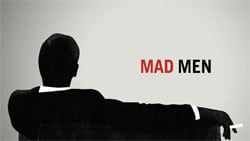In a recent Comment piece, Jamie Smith argued that one of the foremost challenges facing Christians today is not whether or not we ought to engage popular culture–that battle has been won. The new question we have to face is what the shape of our engagement will be. We’re no longer wondering “Is it OK for Christians to watch R rated movies?” or “Is it OK for Christians to work in politics?” Those questions have been definitively answered in the affirmative. Now the questions are “how do Christians watch movies?” and “what sort of political presence should Christians pursue?”
This weekend Christians will have an excellent chance to put this thinking into practice as we consider AMC’s returning hit Mad Men, which opens season six on Sunday evening. In years past, evangelicals would brush the show aside, put off by its libertine sexual ethics, the colorful language used by some of the characters, and the general moral free-for-all that defines the show. Today’s evangelicals, reacting against the legalism (real or perceived) of their childhood faith, have often instead embraced the show, citing its exquisite settings and costumes, excellent writing, and tremendously complex characters.
While it is certainly good that evangelicals can recognize and appreciate good art when they see it (it was not always so), I do feel some trepidation all the same about our embrace of shows like Mad Men. Churchill famously said that first we shape our buildings and then our buildings shape us. I suspect that something similar happens when we’re talking about stories.
In older stories, what Chesterton would likely call the great fairy tales, we hear a story of a great hero who we come to love. We cheer for him in his triumphs and grieve his failings and above all we hope for him to come to a good end. So we cheer when Frodo destroys the ring or when Orlando and Rosalind are finally brought together.
Of course, other stories create a different sort of hero or, more properly, an anti-hero–a protagonist that we initially admire and support but who becomes a loathsome villain as the story is told. Dorian Gray, Macbeth, and Walter White all come to mind as good examples of anti-heroes.
The important commonality both types of stories share is that there’s a real moral universe standing behind the story and the story takes place in that predefined world. So Frodo is an heroic figure and if we grow to love him we will have done well. Likewise we ought to learn to despise Walter White, even while perhaps holding out hope that something might get through his pride and ego deep enough to remind him of the man he once was.
But there is another way to tell a story, which begins by blowing up that moral backdrop and replacing it with an aimless, purposeless, utterly silent universe. (Here Matt would say that we’re simply talking about the old Greek debate between the chaos of Homer and the order of Plato.) In chaotic stories, we can’t really judge characters as being good or evil, but simply as being effective or ineffective at doing what they want to do. Think of Albert Camus’ The Stranger or the recent film There Will Be Blood. In a chaotic story, all that ultimately exists is the individual. And the individuals in the story are either strong enough to act as free beings unencumbered by limitation (think of Camus’ narrator who kills a man on the beach and feels no remorse) or they’re too weak and are crushed by rival characters more willing to do what’s needed (think of Daniel Plainview killing Eli Sunday in There Will Be Blood or Francis Underwood’s manipulation of Congressman Russo in House of Cards). Oftentimes, these chaotic stories may be compelling narratives, but the universe in which they take place is so bleak and terrifying that we can’t feel any attraction to it. (Game of Thrones would be another good example of this, I think.) “Life’s a bitch” may make for an interesting story, but it doesn’t make for much of a world. And when we see the bleak chaos of Sartre’s Nausea or the 2007 film No Country for Old Men, we are rightly horrified and come away from it hoping for something to bring order to the chaos.
And this brings us back to AMC’s Mad Men.
Login to read more
Sign in or create a free account to access Subscriber-only content.
Topics:

